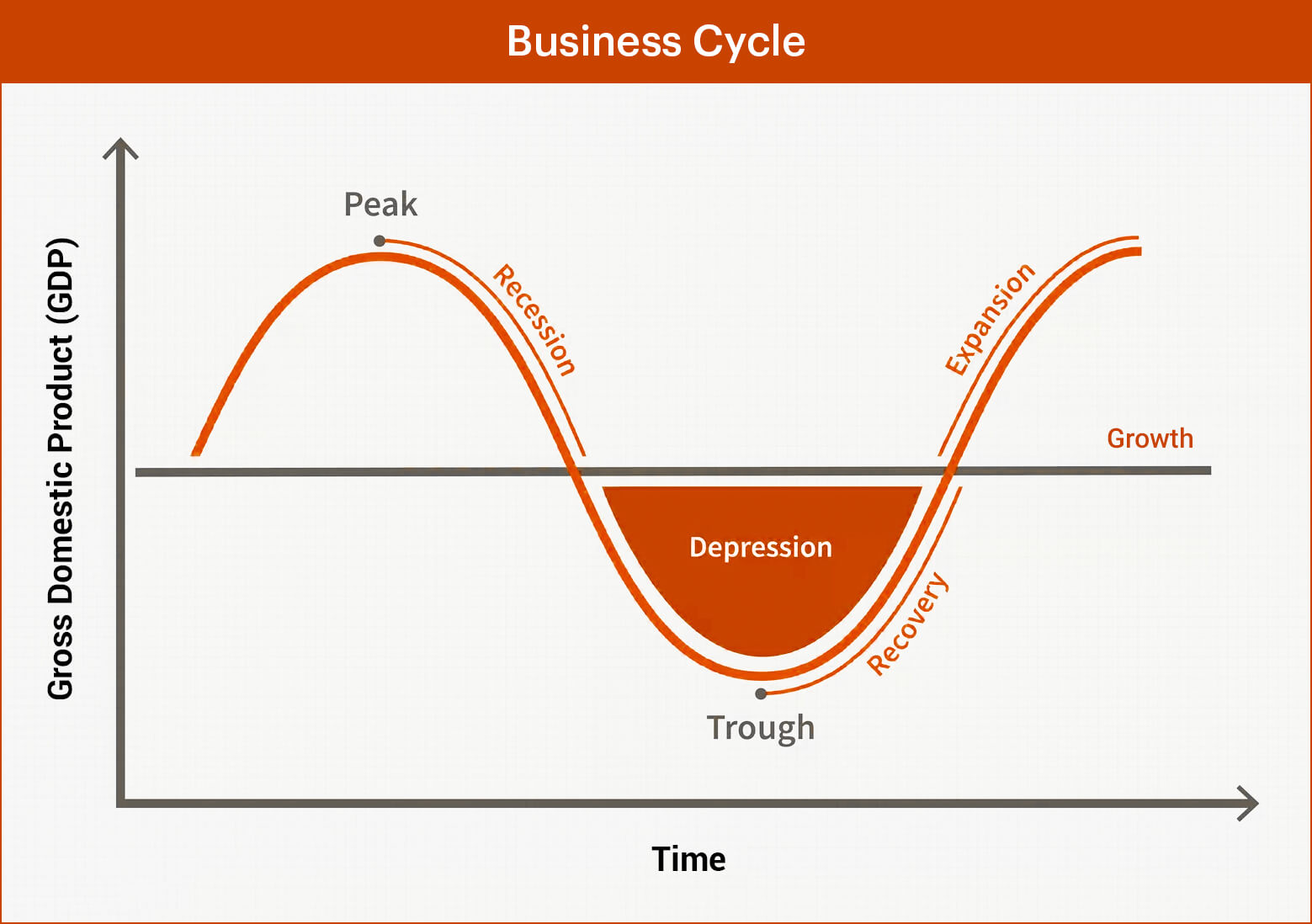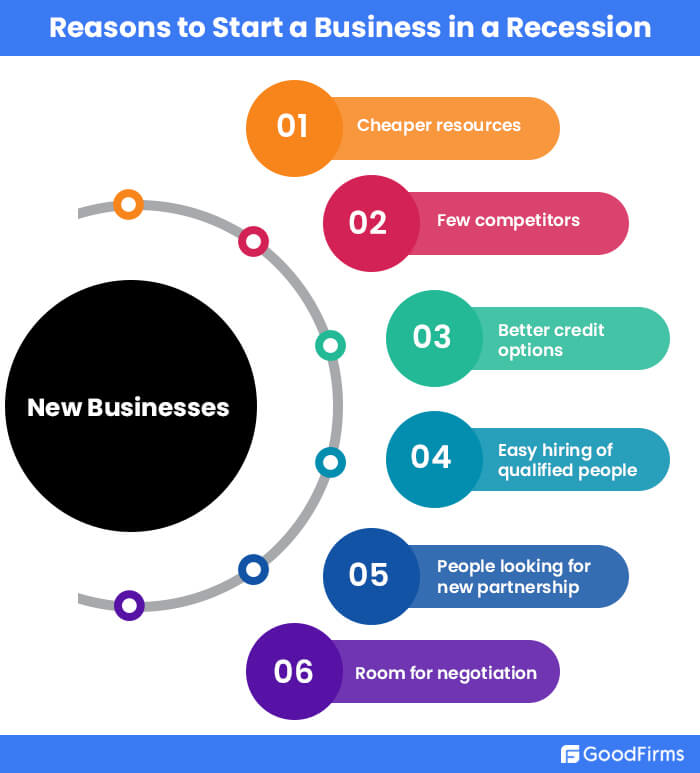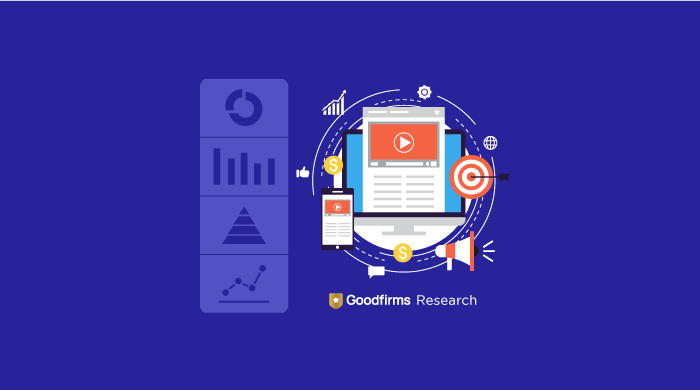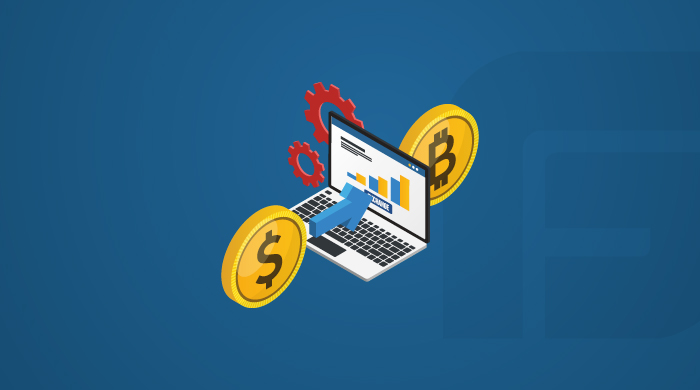After a record of 128 months of expansion, somewhere around March 2020, the fall-out from the coronavirus pandemic tipped the world into a recession like never seen before. Because of a drop in industrial production, retail sales, and real personal earnings, people have limited disposable income. And so, they have tended to restrict their spending to essentials.
All and all, there is a significant contraction in economic activities, which has hampered the growth of the economy. In such circumstances, it is not easy to start a new business from scratch. Still, potential entrepreneurs can have a once-in-a-generation chance to develop their idea into a revenue-generating enterprise. A business that addresses the problems stemming from current needs and provides the best solution can find a foothold in the toughest times. Management consultancies can review the new companies' operations and requirements and help them survive by making appropriate recommendations.
Goodfirms surveyed 50+ entrepreneurs worldwide to find out about the viability of the new businesses during the economic recession and their expert advice for starting a one in the time of crisis.
What is Recession?
It is a recession when many people suddenly find themselves out of work, businesses fail to have normal sales, and the economy struggles to a level where the country's overall economic output decreases.

According to the National Bureau of Economic Research (NBER) - the authority that officially declares the U.S. recessions, the recession is -
"A significant decline in economic activity spread across the economy, lasting more than a few months, normally visible in real GDP, real income, employment, industrial production, and wholesale-retail sales."
A recession is a normal and unavoidable part of the 'business cycle.' The 4 stages of the business cycle - expansion, peak, contraction, and trough - illustrate how an economy alternates between periods of expansion and recessions. The beginning of an economic expansion shows healthy growth in the economy. As it progresses, asset values rise quite rapidly, and the debt load increases. At some point in the cycle, the economic expansion gets derailed, the stock market crashes, and debt loads become too large to maintain. Subsequently, growth contracts and the world sees the recession.

There is no accurate way to predict when and how a recession will occur. Apart from two consecutive quarters of GDP decline, economists consider several metrics to decide whether a recession is approaching or already taking place. Though they are often portrayed as short-term events, the decreased economic activities can have long-lasting damaging effects on the individuals’ financial situations and the economy more broadly.
Earlier this year, the Organization for Economic Cooperation and Development (OECD) warned that if the virus continued to spread, global growth could be cut in half to 1.5% in 2020. And now, when it is the fourth quarter, the world is still struggling to prevent the spread of the virus.
Economic Consequences Of Recession Across The World
A recession cannot be thought of as a one-time event because it impacts not only the entrepreneurial activity and business formation. But also, the prospects of the individual's family members, including children's education and private investment, get affected for years to come.
The main consequences of a recession are:
- Rising unemployment
- Sluggish industrial manufacturing growth
- Reduction in working hours
- Decreased income and rise in relative poverty
- Plummeting asset prices
- Increased government borrowing (less tax revenue)
However, despite bringing all this pain, recessions do have some beneficial effects, such as re-allocating resources, disciplining investors, buying opportunities, etc. Also, most people tend to watch every cent that goes in the purchase, which increases savings.
Rapid Rise In Unemployment Is Driving An Increase In Entrepreneurship
Entrepreneurs play quite a crucial role in the process of industrialization and economic development. According to the University of Missouri's research during the last recession, the rising unemployment rate generally inspires people to become financially self-reliant.
Shane and Emery Murphy from Monsta Money Clothing say, "Although there are risks with starting a business during a recession, there's the possibility of being laid off or furloughed due to a recession when you work for a company. However, when you work for yourself, job security is much more predictable. This is one of many reasons why there is no time like the present to go into business for yourself."
The layoffs also present an opportunity to the potential entrepreneurs as they have more options to hire the best talent who's looking to be re-employed. Mason Culligan, Founder and CEO of Mattress Battle Inc., says, "You can also find highly skilled individuals that can help you with your business due to massive layoffs. Take advantage of hiring the best people as you have a lot of options in the talent pool. Also, be confident with your competence and ability to adapt to the changing environment."
Recession Is Difficult Yet Good Time To Start A Business
With their inherent agility, startups can take advantage of a weaker economy and have favorable outcomes. If they operate a lean business model from day one, maximize value for customers, they can survive against all the odds. Economic uncertainty is never a desirable situation to be in. Still, some of the world's greatest businesses, such as General Electric, General Motors, Netflix, Airbnb, have started during a downturn or recession.
"When you start a business during a recession, you may have fears and doubts," says Timo Wilson, CEO of Asap Credit Solutions. He further adds, "But, with careful planning, the right strategies, and the right attitude, you can turn a bad situation into a good opportunity. Some of the reasons why a recession can actually be a good time to start a business are:
- Starting a business during a recession is cheaper and faster.
- You will have fewer competitors.
- There are better credit options.
- You will build a lean startup.
- You have less to lose and more to gain."

23 Piece of Advice from Entrepreneurs for Starting a Business during Recession
Entrepreneurs certainly need to make better decisions and act more swiftly than they’d do in the middle of a booming market. 26 experts share 23 excellent pieces of advice that will allow the entrepreneurs to launch their dream business amidst the unstable market!
1. Find Out If Your Business Is Viable During Economic Downturn
Diony McPherson, Co-Founder of Paperform, believes that the most important question budding entrepreneurs need to ask is whether the solution they are offering solves a widely experienced problem that it produces sustainable and ever-increasing revenue.
She says, "Recessions don't automatically result in a general loss of business opportunities; rather, they present a different set of problems to solve. Some businesses become redundant, and some take off. So rather than asking whether the recession is a good time to start a business, you need to ask yourself whether the recession is a good time to be starting this business."
2. Be Flexible And Lean Into The Current Climate
Jimmy Chebat, CEO and Founder of ZiZo Technologies, insists that transition periods are a perfect time to introduce a new solution into the market. He says, "Leveraging concerns surrounding the recession to introduce your product or business as a solution can be hugely beneficial. My biggest advice to someone who is starting a business during a recession would be - to be flexible and lean into the current climate. Rather than shy away from the problem, highlight how your company could be part of the solution."
3. Research The Problems Caused By Disruptions
Nishank Khanna, Chief Marketing Officer at Clarify Capital, asks to look at how the economy has created new inconveniences and issues and determine where one can provide the most value. He says, "What are people complaining about that they weren't before? Research the problems caused by disruptions to industries and society and come up with a novel solution. When you find that solution, just start - stop checking the stop market and don't wait to be ready."
4. Look At Long Term Solutions Through Covid-lens
"My biggest advice for a person starting a business during this recession is to think long-term when researching and planning,” says David Kolodny, Co-Founder of Wilbur Labs. He adds, "We are looking at all potential ideas through what we have been calling the “COVID-lens." We are taking any idea and mapping out the related long-term trends. We are not concerned with potential short-term shifts or temporary opportunities because they are impossible to predict and won't create lasting businesses."
Ben Taylor, Founder of HomeWorkingClub.com, also agrees, "It's important to view your plans through a recessionary lens: Are you launching something that people are still going to want when they're tightening their belts. By the same token, you must be offering something people will still want when the boom times arrive again."
5. Have A Backup Plan - Find New Partnerships
Whether it is an online or offline business, businesses are looking to generate extra income and diversify income sources.
"It's important to draw up a solid business plan and talk to people you trust. Don't plan narrowly; you should always have a backup plan in case any accident happens," says Carol Li, Growth Marketer and Co-founder of CocoFax. She believes in asking for help as necessary.
Carol adds, "Ask for advice or direction on how to do something related to setting up your business or seek out a business partnership. Many companies are desperate to find new partnerships with new companies that have a different, better, or more innovative way of delivering those products and services."
Scot J Chrisman, Founder and CEO of THE MEDIA HOUSE, also agrees, "I would suggest that don't put all your eggs in one basket. Look for alternative businesses where you can generate another income to support the business you are starting out. Always look for opportunities to create new business ventures and never be afraid to take that first step in starting your own business."
Patrick Connelly, Co-Founder of Stellar Villa, had started his first business while he was also working a full-time 9-to-5 job. He says, "I worked my day and then would go home and work on my own business at night and on the weekends. Once the business became profitable, it provided me with the additional financial security that was different from the paycheck I received at my day job. With my business, I didn't have to rely on someone else for a paycheck, and in bad times like during a recession, this provides a real sense of security."
6. Leverage The Time
Michael Nova, Director at Nova Custom Printing, acknowledges that it might not be the optimal time actually to open a small business. Still, one can learn how to begin planning to start a small business and succeed too.
He says, "What is the one thing we have more now than we ever had before the coronavirus pandemic? Time. Leverage that time to do everything that it takes to start a business: learn new skills, research target customers' demographics, analyze audience data, and study all the possible directions for the new business to take."
7. Research Your Target Market
Petra Odak, who's Chief Marketing Officer at Better Proposals, advises, "Take the time to research your target market and find your target-market fit before launching. Do a beta launch to find out if you can actually solve someone's pain point and do it well enough for someone to pay for it. No matter how high you think of your idea, always validate it."
Nicole Hudson, Founder of Simply Hudson, says, "Focus on a minimum viable product or MVP for your initial launch to test out your target market and expectations on demand for your product or service. Adjust as you learn and take an iterative approach if possible. Remember that post-launch, your company is still in its infancy - allow it time to grow and mature!"
8. Start Small With Minimum Investment
Robin Brown, the Marketing Consultant at Vivipins, says, "I would suggest you start small with minimum investment to understand if your business has a place in the market during this time. If not, see if you can remodel your business according to the market, since the situation does not seem like it will change for a while."
9. Focus On Company's Value Proposition
"Whether or not the recession is a good time to start your business or not is completely dependent upon a company's value proposition," says Luke Haslett from iakoe. He believes that the economic environment is going to be extremely challenging, and customer behaviors will change.
So Luke forewarns, "Inevitably potential customers will be scrutinizing how they spend their cash. Thus businesses that are creating more measurable value for their customers (compared to other market incumbents) will thrive at such a time. My advice to entrepreneurs launching businesses during the recession is to focus on quantifying and proving the superior value they create for their customers compared with other market available alternatives."
10. Have A Sustainable Business Model
"I wouldn't start a new business unless a) I have done a ton of research and have funding figured out independent of loans, and b.) I am very confident in the sustainability of my business model," says Rex Freiberger, CEO of Discuss Diets.
He adds, "If you're going to make it in the business right now, you need to have a business model that will both thrive in and outlast coronavirus. You need that jumpstart of extra sales because of current circumstances, but companies popping up to fill specific needs of COVID aren't going to last."
11. Define Your Brand's Unique Tone Of Voice
Barbara Chancey, Founder and Owner of Barbara Chancey Design Group, says, "New brands should not merely arrive on the scene….they must be impossible to ignore. Never use the same words, story, or design as your competitors to describe how unique you are. Customer service begins long before construction or site selection. Know the words your brand will never use (examples: declined, no, I'm sorry, I don't think so..)"
12. Be Different And Better Than Your Competition
Liz Sara, Chair of the National Women's Business Council, says, "Determine how your idea really differs from other similar businesses in your neighborhood, your region or the country – depending on your proposed audience. Why will customers select your offering and not the competition? Most businesses have competition: determine who they are and figure out how you will win."
13. Get PR And Media Coverage For Your Initiative
Alex Membrillo, CEO of Cardinal Digital Marketing Agency, asks to ensure that the business model is at an angle that sets new businesses apart from the competition. He says, "When I started my company during a recession, we used PR to generate free publicity and media attention. The trick for start-ups to get PR coverage and media attention is to find a unique angle on a trending topic. Also, you have to keep the story evolving. A lot of reporters want to "break" a story, not cover something that has already been featured. So, find new things to talk about."
14. Determine How Long You Can Survive Without Being Profitable
Alex Membrillo says, "The factors to consider for starting a business during a recession are - the industry, viability /demand during economic downturns, the need to secure funding, and how long you can survive without being profitable. If you can go for at least 6 months without taking pay, and there is still demand potential for your business, then the timing could be perfect."
15. Take Advantage Of The Lower Interest Rates
Nishank Khanna says, "Recessions can be an opportune time to fund a business venture because you can snag a deal on financing, as interest rates drop to stimulate economic activity. When the market is strong, interest rates tend to be higher. So, entrepreneurs can actually save money in the long run by taking advantage of the competitive financing options available during economic downturns."
16. Give Yourself A Long Runway To Figure Things Out
"It usually takes 3 years to really know how to run your business, what niche you are going after, to build strong processes, to hire the right people, etc.," says Stephen Halasnik, Managing Partner at Financing Solutions.
He further adds, "It is better to be learning all of this during a recession because when the economy is growing, you can catch the tide. My advice to anyone starting or building a business now is to give yourself a long runway to figure things out. What that means is conserve cash or have another income source. The longer you can stay in business trying to figure everything out, the better your chances will be."
17. Surround Yourself With Successful People
Patrick Connelly says, "My best advice would be to surround yourself with successful people. If you want to succeed, and this is your first business, you will benefit from outside counsel and advice. It's always helpful to bounce ideas off another person, and they may have experienced things in the past from which they have learned valuable lessons and can share with you. While it's great to learn lessons from your mistakes, it's even better to learn from someone else's mistakes so you can avoid making the same ones yourself."
18. Take Advantage Of The Market Pivots
Ivory Coats, President of Mean Coffee Mugs, is a firm believer in taking advantage of the market pivots. He says, "These recessions have done many things, but the most important is they have all included a pivot in consumer spending, and the smart entrepreneurs have made the adjustments and dug their heels in and survived. When you don't pivot, you see things Blockbuster missing the dotcom movement and Netflix taking over."
19. Avoid Overspending
Shiv Gupta, CEO of Incrementors Web Solutions, strictly advises avoiding overspending right now. He says, "Unless you find the right marketing campaign that will be helpful to scale your business in today's current economic condition, you shouldn't be mass spending on advertising or campaigns you had planned before the national emergency. What was likely to work a few months ago won’t work during the economic recession. So instead of this, you should spend time testing and creating a short-term strategy that can lead to long-term gains."
Dirk Mersch, Managing Director at Cambridge Innovation Consulting, also asks to be frugal and learn. He says, "Your goal in the first years, especially during the recession, is not to make money, but to learn about your industry and refine your proposition to the clients. What you need to be is that small tiny mammal that has survived the meteor strike that has wiped out the dinosaurs. You need to be frugal, learn your way around, and be ready to grow and grow fast when the opportunity comes."
20. Keep Your Businesses In Compliance
"Make sure you are able to keep your business in compliance. Incorporate or form a limited liability company (LLC) to protect your personal assets with limited liability protection," says Deborah Sweeney, CEO of MyCorporation.
She further advises, "File for a trademark to protect the unique names, logos, and designs associated with your business from being plagiarized by an outside source or competitor. Obtain an EIN to open up a business bank account and hire employees (when you are ready!) and file for the proper business licenses to be able to operate the business in your city, state legally, and preferred industry."
21. Be Prepared For The Worst-case Scenario
Viviane d'Adesky, President at Plume Creative Consulting, says, "Think of the worst-case scenario: your business fails. Even if this happens, at least you can say you learned many invaluable lessons along the way, whether that's determining to file as an S-Corp vs. an LLC, or getting more comfortable with networking in your new industry. Those skills will propel you through your next venture and can be applied to many areas of your life."
22. Pursue Your Business Idea Irrespective Of The State Of Economy
Nicole Pearch, Owner of Party'n With Plants, believes that if someone has a great idea or the passion for their business to work towards no matter what the economy is doing. She says, "If you're waiting for the right moment, you may actually miss the opportunity. An entrepreneur needs always to adapt to change, renewing, and staying positive. A successful entrepreneur wants to wake up every day and hustle to achieve their dreams no matter the economy."
23. Seek Out The Government Programs
Patrick Connelly, who's also started a business during the downturn, asks to take advantage of the ways the government fosters entrepreneurship. He says, "In New York State, there is a little known program called the "Self-Employment Assistance Program" or SEAP for short. SEAP allows eligible individuals to work on starting their own business while collecting unemployment benefits. This can help you get by and pay your bills while working to realize your dream of being a business owner."
Patrick also suggests seeking out help from the Small Business Administration. He says, "This is a wonderful organization that I have worked with in the past, and they offer many free resources for entrepreneurs... If you find your local office, often they can pair you with a local business mentor, all at no charge."
Experiences Of Entrepreneurs Through a Recession
Starting a business and making it work is difficult even under normal circumstances. And when the market itself is volatile, entrepreneurs need to have a lot of patience and determination and put in more hard work. Despite all the new challenges popped up by the coronavirus, the aspiring entrepreneurs are determined to capitalize on a weaker economy.
Brave The Challenges
"I remember standing in a "socially distanced" line at the registry office surrounded by people wearing masks and asking myself, is this really the right time to start a new business," says Carolyn Scissons, CEO of Regulatory Learning Lab.
Sharing her experience of incorporating a business in June 2020, she says, "I knew I wouldn’t be able to seek any government assistance at that time. The programs offered were limited to companies able to demonstrate the impact COVID had on existing business, not the new business I had dreamed up in my mind for so long before the pandemic struck. Despite these challenges, I have and am proceeding with my new business called Regulatory Learning Lab, which offers niche utility financial and regulatory acumen training."
Take a Plunge
"I purchased 'MyCorporation' out of Intuit in 2009 during the Great Recession. It was a risk that paid off," says Deborah Sweeney, who believes that entrepreneurship, at the core, is full of risks.
She says, "Sometimes there isn't a 'perfect' moment where you realize you are completely ready to start a business and fulfill a dream. It may happen on gut instinct or because you notice there's a service or offering missing that can better others' lives, or simply because it's now or never to follow your dream and fulfill it. It is normal to debate the pros and cons of whether or not to do it, but be confident that once you jump, you'll be able to hit the ground running and move forward."
Conclusion
An inherently unpredictable economy becomes even more uncertain during the recessions with massive closures, layoffs, and lost profits. Now that the world is grappling with the COVID-19 pandemic, people doubt their current jobs' stability and are inclined to take over reins and establish businesses of their own.
It is certainly challenging to start a company in the middle of a downturn, but there are some significant advantages too. For example, availability of talent pool, opportunities opening up for the resilient entrepreneurs, suppliers tending to give better options for credit facilities, etc. Rather than asking whether the recession is a good time, people are asking if it is the right time to start the particular business they've in mind. Companies are doing a ton of research and are still growing depending on their agility and adaptability. Entrepreneurs are seeking out partnerships, but they also refrain from putting all the eggs in one basket.
Keep your outgoings to a minimum with the help of the business services; find out a business model that both thrives in and outlasts coronavirus. The Goodfirms' list of the best ones will let you locate the most appropriate firm for your dream business!








